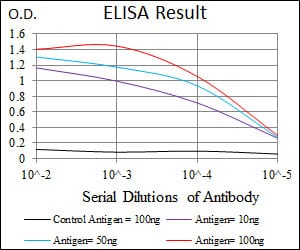
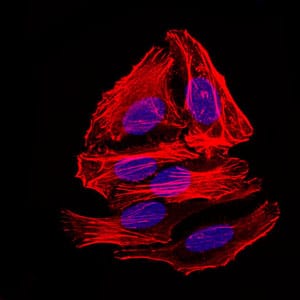
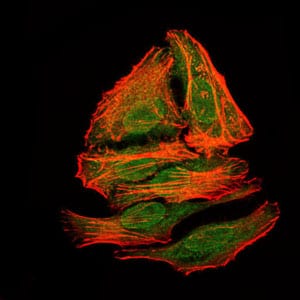
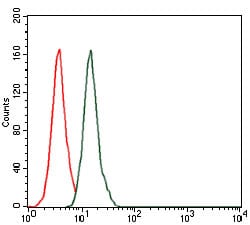
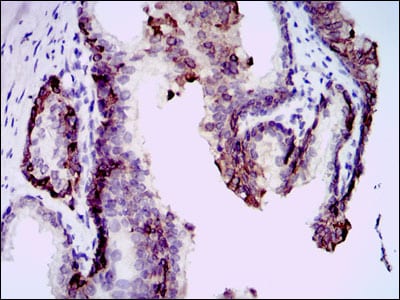
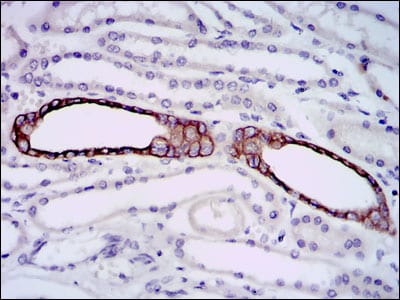
| WB | 咨询技术 | Human,Mouse,Rat |
| IF | 咨询技术 | Human,Mouse,Rat |
| IHC | 1/15-1/50 | Human,Mouse,Rat |
| ICC | 技术咨询 | Human,Mouse,Rat |
| FCM | 咨询技术 | Human,Mouse,Rat |
| Elisa | 1/1000-1/2000 | Human,Mouse,Rat |
| Entrez GeneID | 19194 |
| clone | 1F12 |
| Host/Isotype | Mouse IgG1 |
| Antibody Type | Primary antibody |
| Storage | Store at 4°C short term. Aliquot and store at -20°C long term. Avoid freeze/thaw cycles. |
| Species Reactivity | Human |
| Immunogen | Purified recombinant fragment of mouse Splunc2 expressed in E. Coli. |
| Formulation | Purified antibody in PBS with 0.05% sodium azide |
+ +
以下是关于ACAD9抗体的3篇参考文献及其摘要概括:
1. **文献名称**:*ACAD9 deficiency: A novel cause of complex I deficiency with neonatal hypertrophic cardiomyopathy*
**作者**:Haack, T.B. et al.
**摘要**:该研究通过全外显子测序和免疫印迹分析(使用ACAD9抗体),揭示了ACAD9基因突变导致线粒体复合物I缺陷的机制,并发现其与新生儿肥厚型心肌病及早期死亡相关。
2. **文献名称**:*The role of ACAD9 in mitochondrial complex I assembly and human disease*
**作者**:Nouws, J. et al.
**摘要**:作者利用ACAD9特异性抗体进行蛋白质相互作用实验,证明ACAD9在复合物I组装中的关键作用,并发现其突变会导致多种线粒体功能障碍疾病。
3. **文献名称**:*Diagnostic utility of antibody-based assays for ACAD9-related disorders*
**作者**:He, M. et al.
**摘要**:研究评估了ACAD9抗体在免疫印迹和免疫荧光中的诊断价值,提出通过蛋白质表达水平检测可快速筛查ACAD9缺陷症患者,辅助临床早期干预。
以上研究均通过ACAD9抗体揭示其在疾病机制和诊断中的应用。
The ACAD9 antibody is a crucial tool for studying acyl-CoA dehydrogenase family member 9 (ACAD9), a mitochondrial enzyme essential for fatty acid β-oxidation and the assembly of mitochondrial respiratory chain Complex I. ACAD9 catalyzes the dehydrogenation of long-chain acyl-CoAs, linking lipid metabolism to cellular energy production. Mutations in the ACAD9 gene are associated with mitochondrial disorders, particularly early-onset hypertrophic cardiomyopathy, encephalopathy, and Complex I deficiency.
ACAD9 antibodies enable the detection and quantification of ACAD9 protein levels in tissues and cells, aiding research into its dual metabolic and structural roles. These antibodies are widely used in techniques like Western blotting, immunohistochemistry (IHC), and immunofluorescence (IF) to investigate ACAD9 expression patterns, subcellular localization, and interactions with Complex I subunits. They are also vital for diagnosing ACAD9-related disorders and evaluating therapeutic interventions in preclinical models.
Available as monoclonal or polyclonal variants, ACAD9 antibodies require rigorous validation using knockout controls or siRNA-mediated silencing to ensure specificity. Their application extends to studying metabolic adaptations in conditions like obesity, diabetes, and cancer, where altered fatty acid oxidation impacts disease progression. By elucidating ACAD9's role in mitochondrial health, these antibodies contribute to advancing our understanding of metabolic diseases and genetic mitochondrial dysfunction.
×